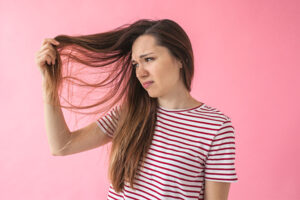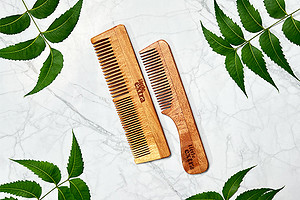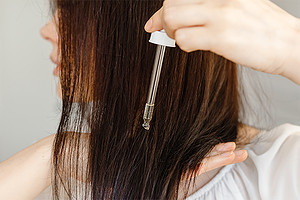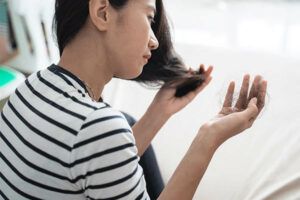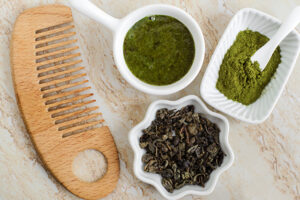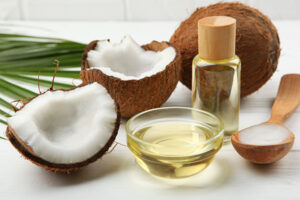Come winter and there is a nip in the air, and all you want to do is cover up in a warm blanket and sip on hot chocolate. This cold season may be a wonderful one, but it can take a toll on your scalp and hair. (1)

The dryness in the air during winter can dull your hair if you don’t take the necessary precautions. During these months, the hair becomes dry, frizzy, and prone to damage. Your strands cannot retain moisture, thus inviting various issues such as dandruff.
So, how can you save your hair from winter blues? This article presents a rundown of hair care tips that will let you achieve a healthy mane this winter.
Tips to Prevent Hair Dryness During Winter
Try these measures to lock in moisture in your tresses and maintain their health in this cold season.
1. Oil your hair
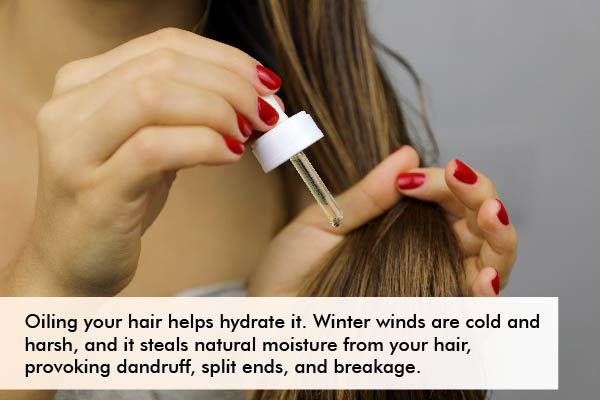
While it may sound old-school, oiling your hair does help hydrate and keep your hair manageable. Winter winds are cold and harsh, and it steals the natural moisture from your hair, leading to dandruff, split ends, and breakage.
Hence, it would help if you give your hair an oil treatment. Use coconut oil, olive oil, sesame oil, or almond oil, (2) which nourishes your hair.
Apply aloe vera gel: Applying aloe vera gel (3) regularly to your scalp keeps the winter dryness away and also helps to get rid of dandruff.
2. Avoid frequent hair washes
Shampooing your hair might be a good way to get rid of dirt and dust on the scalp, but frequent washing is not recommended during the winter season. As your hair is already dry, too much shampooing will aggravate the dryness and result in a dry and flaky scalp.
The best shampoo to use during winter is a sulfate-free shampoo, and a conditioner without silicones is recommended to avoid irritating your scalp and prevent dry hair. (4)(5)
3. Style your hair sparingly
Overstyling increases the risk of damage to the hair shaft. Hair blowers and other tools such as straighteners and curlers (6) can erode the essential oils from the hair shaft, causing dryness and sometimes permanent damage.
So avoid overstyling your hair, and use a heat protectant spray when using heating tools to avoid hair breakage during winter.
4. Enrich your diet with vitamins and minerals
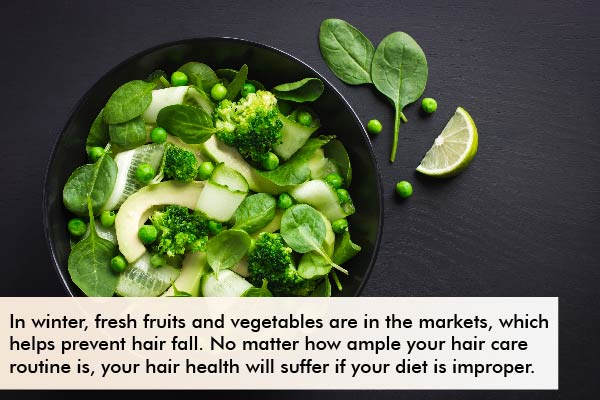
Winter is a time when there is an abundance of fresh fruits and vegetables. Gorging on produce that is high in vitamin C, (7) such as oranges, strawberries, and kiwis, will help improve your eyesight and prevent hair fall too.
Also, it would be best to stay hydrated so your skin and scalp do not become dry. Consuming water at regular intervals prevents hair fall and helps to retain moisture.
Thus, your hair health also depends on your diet. No matter how extensive your hair care routine is, your hair health will still suffer if your diet is inadequate. (8)
5. Deep condition with different masks
Skipping out on deep conditioning is never a good idea, especially during winter.
Properly hydrating the hair improves the hair quality, nourishes the hair fibers, and keeps them moisturized and soft. (9)(10) Conditioners can reverse hair dryness and also provides moisture and shine to the hair.
Hair masks are an effective way to deep condition your hair, improve its sheen, and offer many other hair health benefits.
6. Avoid hot showers
While it may be tempting to have a hot shower, it is not recommended because it strips the natural oils from your hair, especially when the water is steaming hot, leaving no valuable oils in your hair, thus making your hair dry, frizzy, and brittle.
Moreover, hot water removes the moisture from the scalp and makes it dry and prone to itching and dandruff. (11)(12) Hot water also makes the hair roots weak. The texture of the hair also suffers, thus making your hair prone to hair fall.
Hot water makes your hair porous and leads to hair breakage, brittleness, and flyaways, according to experts. The best solution is to clean your hair with lukewarm water and then rinse with cold water at the end to seal the hair cuticles.
General Queries Related to Winter Hair Care Tips
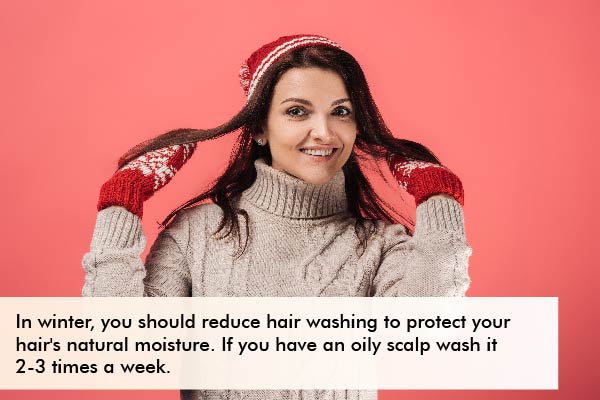
How often should I wash my hair during winter?
Up your winter game by washing your hair every 2 days; if you have an oily scalp, then wash them 3–4 times a week. In winter, you should reduce the frequency of your hair wash to preserve your hair’s natural moisture.
Should I trim my hair in winter?
Regular trimming helps reduce split ends; you should do it every 3 months. You can get a haircut during winter.
However, postpone your hair care treatments such as coloring and rebonding since it requires additional care. If you do plan to get them, however, you will need to look after your hair with the finest-quality products so that your hair stays frizz-free.
How does winter impact my hair?
As the temperature falls, the winds become drier, making your hair dry, flat, and brittle. As a result, your mane and scalp become dry and itchy too and prone to dandruff, split ends, frizz, etc.
Does hair growth increase during the winter season?
There is no evidence to support it. Summer weather might increase hair growth, but experts think it’s because of increased blood circulation due to intense activities done during summer. Increased circulation leads to better oxygen flow and more available nutrients to the hair follicles.
Though improved hair growth may be observed during the summer season, it can also cause damage to the hair like cold weather.
Final Word
Since your hair lacks moisture during winter, it invites troubles such as dandruff, dryness, split ends, static hair, and hair fall.
Treat your hair with the above-mentioned measures and protect your scalp from buildup – these will help keep your hair healthy during winter.
Using essential oils and hair masks will also provide adequate moisture to your hair and scalp, and it will keep your hair frizz-free and detangled, thus making your mane manageable and glossy during winter.
References
- De Vecchi R, da Silveira Carvalho Ripper J, Roy D, et al. Using wearable devices for assessing the impacts of hair exposome in Brazil. Scientific reports. https://www.ncbi.nlm.nih.gov/pmc/articles/PMC6746720/. Published September 16, 2019.
- Mysore V, Arghya A. Hair oils: Indigenous knowledge revisited. International journal of trichology. https://www.ncbi.nlm.nih.gov/pmc/articles/PMC9231528/. Published 2022.
- Surjushe A, Vasani R, Saple DG. Aloe Vera: A short review. Indian journal of dermatology. https://www.ncbi.nlm.nih.gov/pmc/articles/PMC2763764/. Published 2008.
- Punyani S, Tosti A, Hordinsky M, Yeomans D, Schwartz J. The impact of shampoo wash frequency on scalp and hair conditions. Skin appendage disorders. https://www.ncbi.nlm.nih.gov/pmc/articles/PMC8138261/. Published April 2021.
- The impact of shampoo wash frequency on scalp and hair conditions. https://www.researchgate.net/publication/349333296/.
- 10 hair care habits that can damage your hair. American Academy of Dermatology. https://www.aad.org/public/everyday-care/hair-scalp-care/hair/habits-that-damage- hair.
- Vitamin C Deficiency. NCBI Bookshelf. https://www.ncbi.nlm.nih.gov/books/NBK493187/.
- Almohanna HM, Ahmed AA, Tsatalis JP, Tosti A. The role of vitamins and minerals in hair loss: A review – dermatology and therapy. SpringerLink. https://link.springer.com/article/10.1007/s13555-018-0278-6. Published December 13, 2018.
- Sheth P. Hair cosmetics. Indian Journal of Dermatology, Venereology and Leprology. https://ijdvl.com/hair-cosmetics/. Published August 31, 2013.
- Safe hair care spares hair, Johns Hopkins dermatologists report – 11/28/2016. Johns Hopkins Medicine, based in Baltimore, Maryland. https://www.hopkinsmedicine.org/news/media/releases/safe_hair_care_spares_hair_joh ns_hopkins_dermatologists_report.
- Bin Saif GA, Ericson ME, Yosipovitch G. The itchy scalp–scratching for an explanation. Experimental dermatology. https://www.ncbi.nlm.nih.gov/pmc/articles/PMC3233984/. Published December 2011.
- T; RSM. Dandruff: The most commercially exploited skin disease. Indian journal of dermatology. https://pubmed.ncbi.nlm.nih.gov/20606879/.


